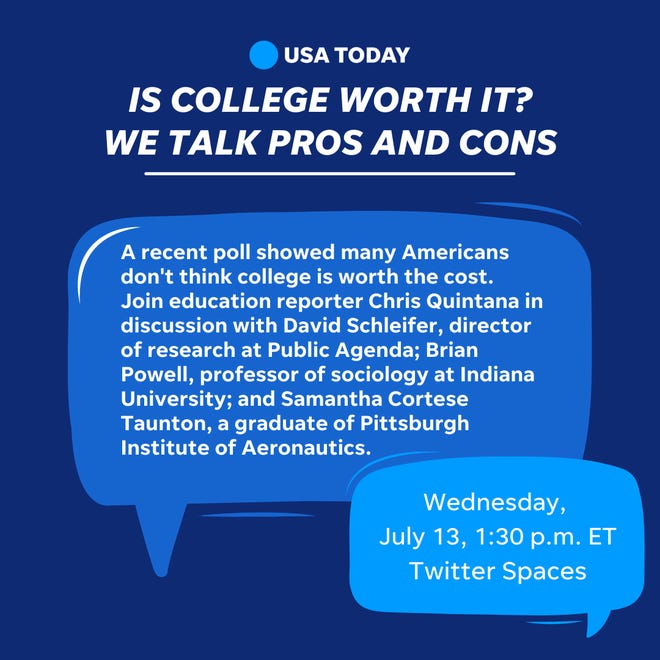How much do Americans value a degree?
[ad_1]
Many Americans question the price and benefit of a university training nowadays, in accordance to a new United states of america Today/Community Agenda Hidden Widespread Ground poll. And of the many better training options available, several see a two-12 months neighborhood university as a far more sensible expense, according to the poll.
In phrases of a sheer price comparison, it’s difficult to argue with these information.
The cost of a bachelor’s degree application is typically substantially greater than that of an associate’s degree or certification application. In truth, it fees virtually a few occasions as significantly on typical to attend a person calendar year at an in-point out four-12 months higher education, than it does to attend a local local community faculty for the exact same sum of time, according to info from a Higher education Board report.
And learners usually go away 4-yr schools with crippling quantities of debt. On average, community university students walk away with about $30,000 well worth of financial loans to pay back again, according to the Schooling Details Initiative.
Support is out there:Our mental wellness crisis is acquiring even worse. New 988 suicide hotline can be our clean start out.
In total, People in america have accrued a lot more than $1.7 trillion in pupil debt in buy to go to four-calendar year schools, in accordance to the facts selection group. And several of them are waiting with anticipation as President Joe Biden considers no matter whether to cancel at the very least a portion of federal pupil loans.
So, increased instruction is way too high-priced. But does that necessarily mean the general public thinks that college isn’t worthwhile?
University can mean greater success
For the past ten years, Brian Powell and I (both equally sociology professors) have been conducting equivalent interviews and surveys with the American public – more pointedly about the obligation for the expense of higher education.

We have asked extra than 4,000 Us residents commencing in 2010 (and every few years by 2020) who should really pay out for higher education and whether higher education should really be an particular person excellent, paid out for typically by mother and father and college students, or a collective very good, paid for primarily by the state and federal government. We’ve also talked to Us residents about what they feel of the prices in relation to the possible advantages.
I should really have helped:As an Asian bystander at an anti-Asian criminal offense, why did I do practically nothing?
Most concur that results without having attending a 4-year faculty is possible. They routinely cite skilled trades these kinds of as plumbers and electricians – work that pupils can train for through value-productive diploma or certification courses. In point, almost all People agree (us integrated) that it is feasible to earn significant wages and have a fantastic everyday living without a bachelor’s diploma.
At the exact same time, Us residents also understand that results is a lot additional possible with a bachelor’s diploma than without the need of a single.
Study extra on poll:Is faculty value it? Us citizens say they value increased instruction, but it is also high priced for several
To the American public, “good” employment are considerably additional abundant, and a great deal a lot easier to get, when students have a four-yr college or university education and learning. Success amongst all those devoid of a bachelor’s diploma is found as the exception. Achievements amongst all those with a bachelor’s degree, on the other hand, is ordinarily noticed as the rule.
In our research, about two-thirds of Americans say college is truly worth the monetary charge it involves.
A lot more assist for authorities to pay
However, much too generally, critiques of the higher price tag of four-12 months faculties and universities are linked with phone calls to disinvest in higher instruction.
But most Americans, in accordance to our information, largely have the reverse reaction.
People are significantly additional probable to endorse federal government funding for higher education than they were even a ten years in the past. There is also a lot more help for the concept of no cost tuition at community schools and universities.
Title IX:New Biden Title IX regulations would use civil legal rights office…to strip civil rights from college students
In this perception, most Individuals see prevalent federal government aid as the remedy to creating higher education a lot more inexpensive. People as a full think deeply in greater schooli
ng and its ability to enrich learners and communities.
Us residents just want larger instruction and its many gains to occur at a good price tag.
Natasha Quadlin is a UCLA associate professor of sociology. Brian Powell is James H. Rudy Professor of Sociology at Indiana University. They are the co-authors of “Who Must Fork out?: Better Schooling, Accountability, and the General public.”
Be part of United states of america TODAY on Wednesday at 1:30 p.m. ET for a live Twitter Spaces dialogue on the price of school.

[ad_2]
Resource url
